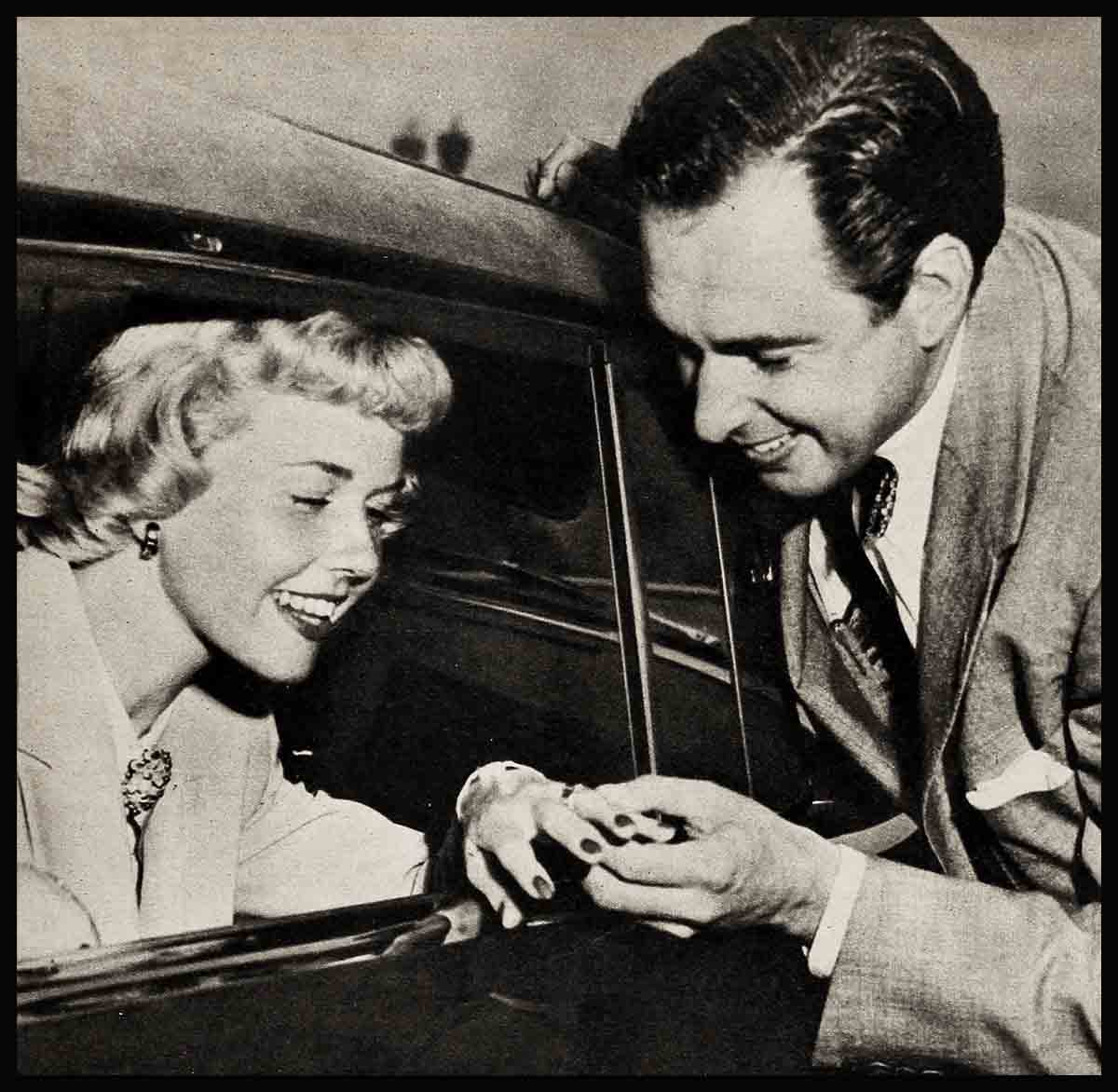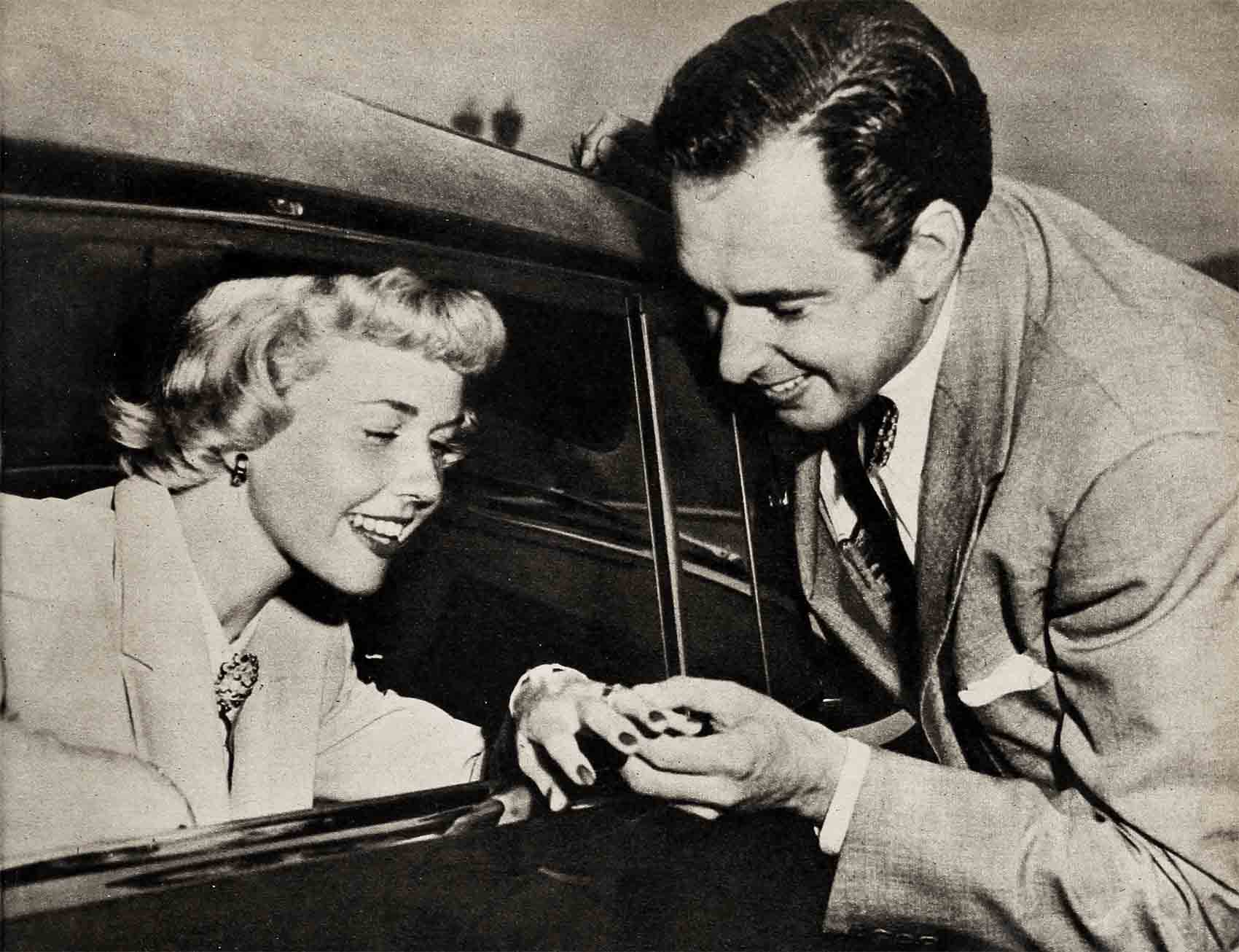
Happy Anniversary!—Doris Day & Martin Melcher
For Doris Day and her tall, dark, handsome businessman husband, love is a private affair. They are very much like that young couple down the block from you. When the wedding bells have been stilled, the rice all swept up, the corsages of the bridesmaids wilted and the bride and groom are back to reality—that’s when the year really starts. That first year together. That year when the newlyweds try to make their adjustments with dozens of admiring friends happily trying to watch their every move. Sooner or later, the newlyweds find they have to close the door and be alone together.
That’s not too difficult for the average couple to do, if one or the other is not in the acting business. Take Doris Day, for instance. During her first year of marriage, she has had to engage in no end of strenuous picture work while creating, at the same time, a happy home for her new husband. Many another actress has found the task impossible. Not Doris. When she watched the big man walk up the path from his car with a couple of huge suitcases in his hands, there was a warm feeling in her heart because this man was to open the door to the happiest chapter in her life.
During those first few days, Marty did the usual things that new husbands do. He’d put the cigarette box where the lighter was supposed to be. Or he’d put his slippers at the head of the bed, instead of at the foot. And Doris did things that caused an equal amount of delightful confusion. And it was fun for them all, particularly for Doris’ son, Terry, because there was another guy around now. Marty was something of a hero to him.
It wasn’t for a week, probably, that Marty’s most amazing trait came to light. That was when Doris learned for the first time that she had married a fixer. A tool-crazy amateur repair man.
It was on a Sunday morning. Marty got up from the breakfast table and sauntered over to the window that looked out on to the garden. He observed the area speculatively for a few minutes, then went outdoors. He sauntered around the yard a bit and then, with one foot touching the other he began to pace off the gravel walk, measuring it. Doris eyed him suspiciously through the window and then went into the yard herself. “Good heavens,” she thought. “He’s probably going to put up an apartment house here.”
“Something wrong, honey?” she asked.
“No,” said Marty somberly, “I think I’m going to put a brick walk in here.”
“Did you ever put a brick walk in anywhere else?” Doris asked quietly.
“Nn-nn,” said Marty, “but it’s easy.”
And it was easy. At five o’clock that evening, 20 feet of neat brick walk had been set. Marty was exhausted, but game. He shuffled off to bed, and was asleep in 20 seconds. At which point Doris exclaimed to herself, “What a man I married!”
Within a very few months, Doris became reconciled to the fact that she was living with an uninhibited jack of all trades. If they were on their way to dinner or a show and Marty snapped a light switch and it didn’t work, he would quietly mutter, “This will only take a minute,” and scamper to the garage for his tool kit. He would have the switch out of the wall in no time and before you could say “Let’s call an electrician,” have the thing all over the floor. “He’s the only man I know,” Doris would say, “who went to parties with tool grease on his tuxedo.”

If an electric iron broke it became necessary to keep it a dark secret or Marty wouldn’t have gone to the office. If the washing machine broke down, the family lived in horror of the thought that he’d find out. And subterfuge didn’t work, because Marty was given to unexpected tours of inspection. Whenever Doris heard a chortle of triumph from some recess of the house, she’d groan in terror because she’d know her husband had detected a flaw in some mechanical contraption that he’d have in pieces before she could get there to save it.
Everything that Marty repaired worked fine afterwards, because Doris would call in the proper mechanic the next day to fix it right—and Marty, not knowing this, swaggered about among his accomplishments like a victory-drunk genius.
“Do you know how we spend our spare time?” Doris once asked a friend. “We’ll be sitting in the garden having a nice rest when Marty will say, ‘I feel like a breath of air. Let’s go for a ride.’ And we go for a ride—to the nearest war surplus store. And I spend a couple of delightful hours among shell casings and rubber rafts. And it’s worse when I don’t go with him. He’ll bring back gas masks, radar equipment, winches, jeep wheels and maybe a pup tent or two. And he always claims he has a use for them. When I get my car in the garage I can’t get out of it, there’s so much junk in there.”
A man can be a trial in many ways during the first year of marriage, but Marty and Doris frankly have had no adjustment problems. There are those who say that Doris and Marty are difficult these days because they do not open their home wide to journalistic sightseers. They have a pair of careers that jell perfectly. Doris in pictures and records. Marty as an agent whose main interest is music publishing. Marty, with his fine sense of humor, will talk endlessly with his friends among reporters, but he drives them a little insane by refusing to behave like the usual new Hollywood husband who brims over with intimate anecdotes about his bride. For one thing, he is too busy with his own For another, he is too busy with Doris and other important matters—not the least of which is helping the kids in their block perfect a small fort from which they conduct mock wars. More often than not, he is joined by Doris in this worthy project while an army of magazine writers fret about how unavailable they are.
And how does Doris feel about all this? Well, most girls would rather go shopping on a day off than lie in bed and have a store deliver a truckload of merchandise free. Doris Day is no different. There is some secret thrill she shares with all females that comes from peering into glass show cases and trying on shoes and gowns she hasn’t the slightest intention of buying.
“It happens often,” Doris said. “Marty will say, ‘Come on, kid let’s go into Beverly Hills and do a bit of shopping.’ I dash to the car before he changes his mind, my head whirling with dreams of silk and leather and gold. And do you know where we go shopping? In a hardware store. I linger close to the door for a couple of hours, wistfully thinking of Saks and Magnins while Marty wallows in Stillson wrenches and ball-peen hammers. My heart is in the May Company basement—while his is in the screw driver or the nut and bolt department of the hardware store. One day he discovered aluminum nails and he went into such a fit of ecstasy over the astonishing advantages of the things that he almost had me convinced we should buy a couple of barrels of them, get a couple of hammers, and go home and pull all the old iron nails out of our house and replace them with aluminum ones before the building collapsed.”
Christmas time is a time for gifts and part of the joy of Christmas is slyly trying to find out what a person would like, so that there will be a delightful surprise under the tree on Christmas morning.
“Ha!” said Doris Day about Christmas. “Two months before December 25th I asked Marty what time it was. ‘Tools,’ he said. The next day I asked him what time he’d be home from work. ‘Tools,’ he said. When he injured his finger in the car door, instead of a masculine oath he howled, ‘TOOLS!’ And then several weeks before Christmas all his equipment mysteriously disappeared. He’d glare at a useless toaster and scowl that he’d fix the doggone thing in a jiffy if he had even a screw driver. If he had even a nail file with a razor edge!

“And when I’d open a knitting box,” said Doris, “I’d find a circular advertising a hobbyists’ home plumbing equipment in the middle of a ball of yarn, or an ad torn from a magazine in my make-up case extolling the qualities of a Handi-mechanic that would buff silver, drill holes in concrete, serve as a barbecue spit and repair shoes. So what do you think I got him for Christmas? A nice silk robe, a gold watch, a polo pony? Not on your life! I got him tools. I didn’t dare get anything else.”
And there was the time that Marty surveyed the back yard and decided it should be illuminated at night. Like a master landscape architect, he plotted the position of the lights he intended installing—and when he was satisfied that his calculations were correct, he spent hours in the trees and atop the outer buildings stringing wire and bracketing on reflectors. When it was completed Marty went back to business and stayed away long enough one day for Doris to have the job redone by a quiet little man who knew what he was about.
“But ever since,” says Doris, “it has been his pride and joy. When we have guests for dinner, Marty doesn’t take their coats and escort them to chairs. He snatches at them the minute they enter the front door and charges them to the back yard where he spends ten holy minutes flicking the switch on and off and telling them how the idea originally came to him and why the biggest light is in the tree where it illuminates the rose bushes instead of atop the garage where it would light up a camellia bed.”
But any woman can tell you that a man is an inconsistent creature. Suddenly, without warning, almost as though a serious illness has left him, a man will fall into an I-don’t-care spell. Like, with Marty, the time the door knob came off the front door. For almost a month he would leave in the morning, grasp the knob and have it come off in his hand. Patiently, he would fiddle with it for five minutes until he had the knob back in place just enough so that the door could be opened. Then he would whistle off to work as though everything were in complete order.
These strange, unexpected periods generally end as abruptly as they begin. One evening Marty was reading the paper. Suddenly he sat bold upright, as though he had been stung by a bee. A frantic light came into his eyes and he leaped from his chair yowling for his tools—and although it was a bitter cold night, he held the door open half an hour while he knelt in a perspiring struggle with the obstinate piece of hardware. And he slept well that night, serene in the knowledge that he had successfully once again defeated a threat to the safety of his family and castle.
There were other things in that first year that had to be adjusted. Things that had to be experienced so they could be recognized as part of the life a woman lives with a man. None of them were serious. Things like the irregular hours a man likes to eat—and the frequent disappearances a man will make into a shower with, apparently, a sole purpose—to drain off all the hot water in the house. There were the volley ball teams he organized among the neighborhood kids, which resulted in the Melcher home being turned into a sort of branch YMCA.
But it was fun. At the end of the first year, Doris Day could count up 12 months of uncertainty and surprises, but 52 weeks of laughter and happiness.
And with a year under her belt, she could look back on the experiences with a smile and a lump in the throat. What, after all, is closet space and drawer room compared with loneliness? What is a home without a man puttering about ruining the garden walk and facing electrocution installing mazda miracles in the back yard? What is a house without a lanky, serious-faced putterer who leaves holes in the wall and pliers behind the sofa cushions? What is an odor of creosote when you know it comes from a man’s desire to “protect” your garden furniture against the tricky weather. It’s sweeter than incense ever was!
Doris Day vows it was fun. And she wants a lot more of it. She wants as much of Marty in her home as there is—all of him for all time.
And nowadays when Doris looks out the living room window and sees Marty coming up the walk empty-handed, she wishes he was carrying something, like more suitcases or another armful of clothes. She wishes there was something to fix, because she likes to see him relax that way. And she hopes he’ll suggest they go for a ride or shopping, so they can buy a few more gas masks or obsolete bayonet mounts—or maybe hang around a hardware store finding out what’s new in the world of mechanical magic.
Ask Doris Day and she’ll tell you the first year was fun—and she’s looking forward to many more of them with her man around the house.
THE END
—BY JIM BURTON
It is a quote. MODERN SCREEN MAGAZINE MAY 1952




